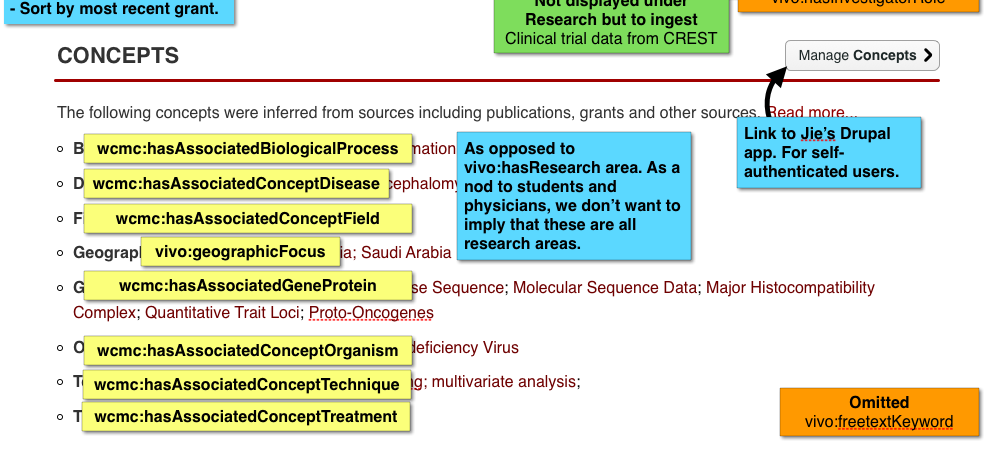Recent ontology list issues
Editorships and translatorships
- (Patrick) We agree with the apparent consensus that it would be best to move toward an Editorship context node for connected editors to publications. The authorship node has been a useful place to hang attributes, such as whether a faculty member has "favorited" that publication. Does anyone object to applying the same logic to Translatorship? Or have a better name for it? I guess there is less chance to have several translators on one publication (though I would not bet too heavily on that), but translators might also "favorite" some publications.
Report from Duke on local extensions to support Humanities faculty
- (Damaris)
Modeling concepts without calling them research areas
- (Paul)
Sample statements (compare to how VIVO represents internal concepts as SKOS and external concepts in other namespaces by default)
| subject | predicate | object |
|---|---|---|
http://vivo.med.cornell.edu/individual/cwid-ccole | wcmc:hasAssociatedConceptDisease | http://vivo.med.cornell.edu/individual/n774 |
| http://vivo.med.cornell.edu/individual/n774 | rdfs:label | Crohn's Disease |
| http://vivo.med.cornell.edu/individual/n774 | wcmc:cui | C0008345 |
| http://vivo.med.cornell.edu/individual/cwid-ccole | wcmc:hasAssociatedConceptGeographicArea | http://vivo.med.cornell.edu/individual/n5750 |
| http://vivo.med.cornell.edu/individual/n5750 | rdfs:label | Haiti |
VIVO-ISF academic module diagram
- (Brian)
Formalizing an VIVO-
Updates
- Brown
- Florida
- Johns Hopkins
- Scripps (Michaeleen)
- Continuing to work on Grants ingest from NIH Reporter
- Virginia Tech
- Weill Cornell
- others
...
ISF Ontology Working Group
Representatives of each of the organizations sponsoring VIVO (see http://vivoweb.org/sponsorship) will be meeting on Wednesday afternoon, August 14, at the VIVO Conference for the first official VIVO Sponsors Meeting. One item on the agenda is to formalize a set of working groups, with the current and potential activities of this group and listserv providing one example.
...
With release 1.6, VIVO will be adopting a larger ontology derived from the VIVO and eagle-i ontologies and addressing broader needs in research representation including research resources and clinical expertise. The ontology will be promoted going forward as the Integrated Semantic Framework or ISF, but will continue to be managed by members of the VIVO community together with participants in the CTSAconnect project representing eagle-i and the biomedical research community more generally.
It will be helpful to have a conversation on this call about how people would like to conduct this group in the future and what its goals could and should be for the remainder of the VIVO Project incubation period, through the end of calendar 2014. Ideas might include:
- more explicitly developing and prioritizing issues for upcoming releases
- establishing sub-groups to work on specific areas of interest such as provenance
- working with members of the development team to design and test improvements to the VIVO ontology editor and/or features of VIVO to better manage and reflect ontology-related requirements, including VIVO's additional operational ontologies including the application configuration ontology, display model ontology, authentication and authorization ontology
- working with the Vitro code base as an ontology-driven application platform for projects unrelated to VIVO including Semantic Web education and training
- adapting and extending the VIVO/Integrated Semantic Framework (ISF) ontology for new domains, preferably by evaluating and adopting existing ontology efforts by other parties but also by targeted new ontology work
- working with members of other VIVO Working Groups to improve the ontology to support multi-site search, including issues such as sameAs assertions, shared instance data, and linkages to externally-managed terminologies and authoritative name services for people, organizations, geographic locations, events, or projects
- working with representatives of non-academic organizations to better understand the needs of labs, government or non-profit organizations, or consortia adopting VIVO
- evaluating existing and new tools to support ontology creation, editing, change management, release, and evaluation, ideally in a networked rather than single-user environment
- participating as representatives for VIVO in ontology projects with the W3C or other groups
- establishing a more formal process for moving the Integrated Semantic Framework forward through public releases, in coordination with the eagle-i community and other interested parties and not necessarily strictly tied to VIVO software releases
Your thoughts are very much appreciated, and feel free to add comments on a wiki discussion page for the VIVO-ISF /VIVO Ontology Working Group even if you can't attend these two meetingsthe meeting.
Updates
(as time permits)
- Brown
- Florida
- Johns Hopkins
- Scripps (Michaeleen)
- Continuing to work on Grants ingest from NIH Reporter
- Virginia Tech
- Weill Cornell
- others
WebEx Call-in Information
Topic: 2013 Bi-weekly VIVO-ISF Ontology Call
- Date: Every 2 weeks on Wednesday, from Wednesday, January 23, 2013 with no end date
- Time: 11:00 am, Eastern Standard Time (New York, GMT-05:00)
- Meeting Number: 648 855 983
- Meeting Password: (This meeting does not require a password.)
To join the online meetingGo , go to https://cornell.webex.com/cornell/j.php?ED=169403917&UID=492782112&RT=MiMxMQ%3D%3D
Call-in Information
code- Call the number below and enter the access code:
- Call-in toll-free number (US/Canada): 1-855-244-8681
- Call-in toll number (US/Canada): 1-650-479-3207
- Global call-in numbers: https://cornell.webex.com/cornell/globalcallin.php?serviceType=MC&ED=169403917&tollFree=1
- Toll-free dialing restrictions: http://www.webex.com/pdf/tollfree_restrictions.pdf
- Access code: 648
- 855 983

